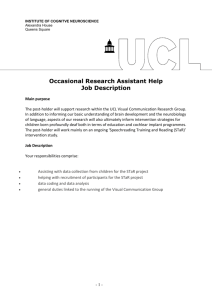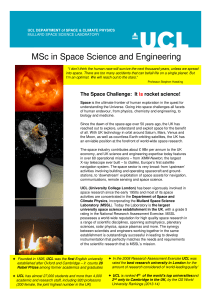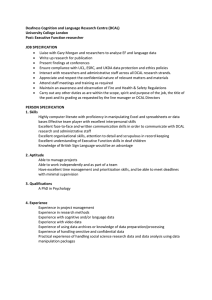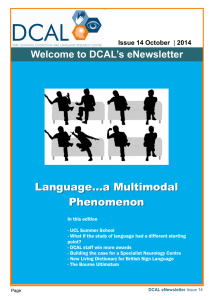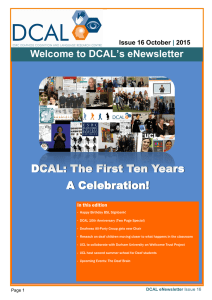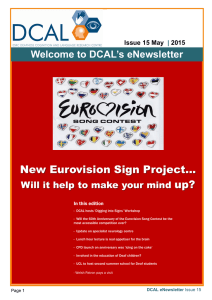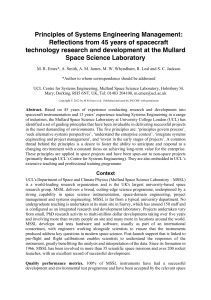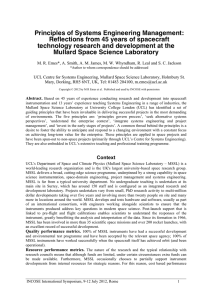1. Telling public groups about our work
advertisement
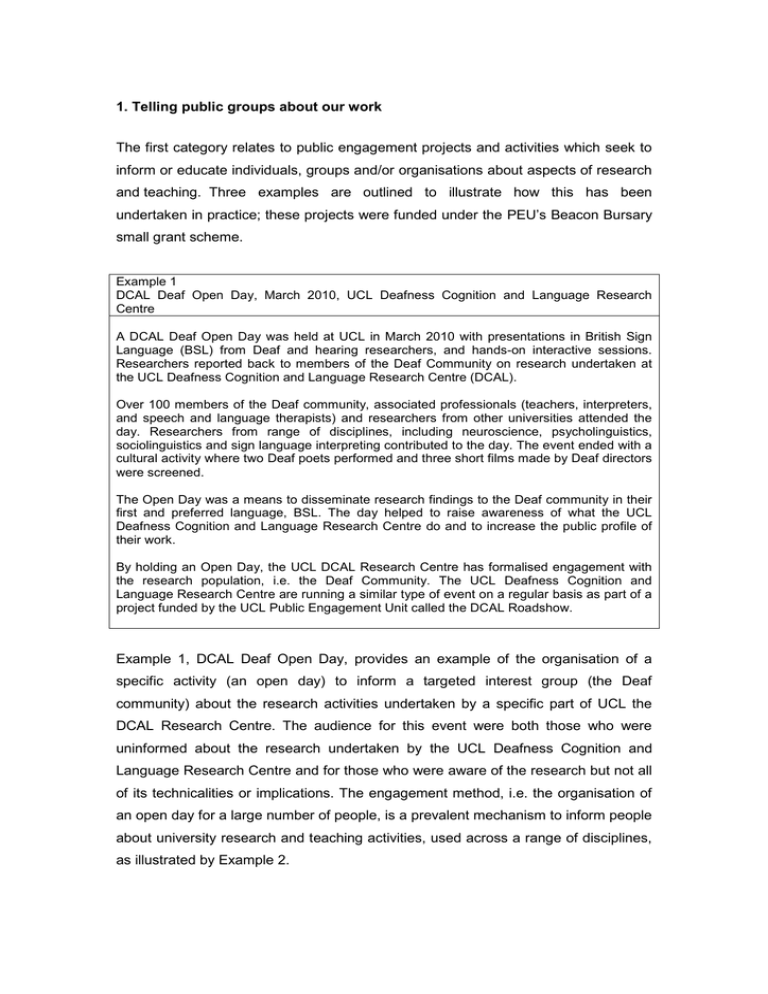
1. Telling public groups about our work The first category relates to public engagement projects and activities which seek to inform or educate individuals, groups and/or organisations about aspects of research and teaching. Three examples are outlined to illustrate how this has been undertaken in practice; these projects were funded under the PEU’s Beacon Bursary small grant scheme. Example 1 DCAL Deaf Open Day, March 2010, UCL Deafness Cognition and Language Research Centre A DCAL Deaf Open Day was held at UCL in March 2010 with presentations in British Sign Language (BSL) from Deaf and hearing researchers, and hands-on interactive sessions. Researchers reported back to members of the Deaf Community on research undertaken at the UCL Deafness Cognition and Language Research Centre (DCAL). Over 100 members of the Deaf community, associated professionals (teachers, interpreters, and speech and language therapists) and researchers from other universities attended the day. Researchers from range of disciplines, including neuroscience, psycholinguistics, sociolinguistics and sign language interpreting contributed to the day. The event ended with a cultural activity where two Deaf poets performed and three short films made by Deaf directors were screened. The Open Day was a means to disseminate research findings to the Deaf community in their first and preferred language, BSL. The day helped to raise awareness of what the UCL Deafness Cognition and Language Research Centre do and to increase the public profile of their work. By holding an Open Day, the UCL DCAL Research Centre has formalised engagement with the research population, i.e. the Deaf Community. The UCL Deafness Cognition and Language Research Centre are running a similar type of event on a regular basis as part of a project funded by the UCL Public Engagement Unit called the DCAL Roadshow. Example 1, DCAL Deaf Open Day, provides an example of the organisation of a specific activity (an open day) to inform a targeted interest group (the Deaf community) about the research activities undertaken by a specific part of UCL the DCAL Research Centre. The audience for this event were both those who were uninformed about the research undertaken by the UCL Deafness Cognition and Language Research Centre and for those who were aware of the research but not all of its technicalities or implications. The engagement method, i.e. the organisation of an open day for a large number of people, is a prevalent mechanism to inform people about university research and teaching activities, used across a range of disciplines, as illustrated by Example 2. Example 2 follows the traditional model of allowing members of the public access to the university (e.g. people, subjects and facilities). However, the organisation of MSSL 2009 Community Open Day is worthy of special consideration. Ten representatives from the surrounding geographical area spent an evening at Mullard Space Science Laboratory before the open day to give their ideas on the event. The discussion was focused on three aspects: the format of the day; the content of the day (i.e. which science themes they could include) and; how to develop longer term relationships between the local community and UCL-MSSL. The discussion was organised around two short talks from staff at MSSL and the output of this discussion was used to set the agenda for the open day. Example 2 Mullard Space Science Laboratory Community Open Day, September 2009, Mullard Space Science Laboratory th This was the 4 annual open day for Mullard Space Science Laboratory (MSSL). The one day event included talks, opportunities to talk one-to-one with MSSL staff and students, equipment and poster displays, children’s’ activities and a demo-competition organised by students. The event aimed to develop community links and encourage the local community, i.e. those geographically surrounding MSSL, to view the laboratory as an outward facing institution. The Community Open Day was attended by 220 members of the local community, mainly attracting a family audience. The annual Community Open Day is considered a high profile public event for MSSL. The day is supported by the Head of Department who encourages all staff and students to be involved. Twenty-five members of staff and students volunteered in the planning, organisation and delivery of the Community Open Day from the Head of Department to students, research scientists, engineers and administration staff. A range of techniques, other than open days, can be used to inform or tell public groups about research and teaching activities, as demonstrated by Example 3 a project titled Destination London undertaken by the UCL School of Slavonic and East European Studies. Example 3 Destination London, October-December 2009, School of Slavonic and East European Studies Destination London was a series of public events and activities structured around the experiences and perceptions of East Europeans who have written about London. The project marked the completion of the Arts and Humanities Research Council (AHRC)-funded East Looks West travel writing research project. The public events and activities included: a book launch, panel discussions, writing workshops, podcasts, the production of a booklet, the creation of a project website. These events and activities had a number of specific aims including, to: open up the results of UCL research to a wider audience; publicize UCL’s resources on travel writing, and on London, to interested audiences (both academic and non-academic); target London communities that may not previously have engaged with the university; explore how new forms of distribution and publishing can be used to extend the impact of UCL research and contemporary writing from outside the mainstream. The events brought together a mix of Londoners, some with an East European heritage, interested in the changing character of the city and interested in writers and writing about London. The range of activities allowed the School of Slavonic and East European Studies to test a variety of different methods of exchanging knowledge and research e.g. web-based, printbased and public talks. Destination London, Example 3, was a series of activities linked to the completion of the AHRC-funded East Looks West travel writing research project. These activities were organised with the prime purpose of disseminating the findings or results of a research project. However, the member of staff who led the project noted an unexpected outcome of organising the activities: “For my own part, one result was unexpected. Hearing so much from the audiences about their personal experiences, and about contemporary travels of the sort that don’t usually get written up as ‘literary’ travel writing has shifted my own current research plans to include these – and has given me some of the contacts that will make this possible. For me, the greatest personal benefit of the whole programme has been the new and unexpected perspectives I’ve received on my own research”.
